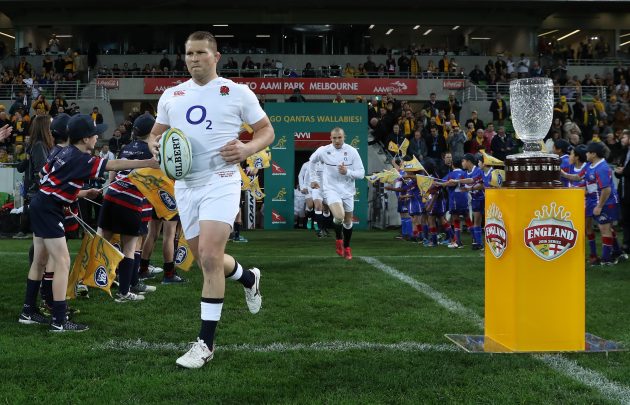Dylan Hartley’s captaincy has been a fundamental part of England’s revival under Eddie Jones – what makes a good captain or is it all a load of hokum?
Back in 2013 Wales battered England into submission, 30-3, in Cardiff ending the Grand Slam dreams of Stuart Lancaster’s team and claiming the Six Nations title for themselves. The result had far-reaching ramifications.
It put the kibosh on the ambitions of several English players going on the British & Lions tour to Australia later that summer, including then-captain Chris Robshaw, and it sealed Sam Warburton’s appointment as skipper of that trip.
Three years on and Lancaster’s replacement, Eddie Jones, has been talking up the chances of Dylan Hartley being made leader of the Lions when they head to New Zealand in 2017. He has done his cause no harm by leading England to a Slam and a series win in Australia eight months after it looked as if he could be out with the international washing after missing the World Cup.
So is Hartley some kind of alchemist who has helped, with some major assistance from Jones, turn a bunch of flops into the second highest-ranked team in the world, has he just got lucky or is it a bit of both?
Martin Johnson, England’s greatest on-field leader, always told us that captaincy was over-rated and the mystique attached to it was all media nonsense.

The greatest: Martin Johnson is widely considered the greatest England captain of all time
He said you had to have leaders all over the pitch and his side, that won the World Cup in 2003, was chock-a-block with them.
He had Lawrence Dallaglio, Matt Dawson, Will Greenwood, Jonny Wilkinson, Phil Vickery, Neil Back and co around him to help out. But Johnson was King of the Jungle, even if he did not want to say it publicly.
Hartley has a similar back-up team. He has three vice-captains in Mike Brown, Owen Farrell and Billy Vunipola, James Haskell and Robshaw have extensive captaincy experience, George Ford calls the shots from No 10 and George Kruis runs the line-out. But Hartley is still the boss on the pitch.
As captain you have to be in touch with the lads but you cannot be one of the lads – there is a line. After the second Test win in Australia, Jones told us that Hartley had pulled up one of the squad for being late for a meeting, by two minutes. The boss loved that because he reckons that if standards slip, even little ones, then the whole operation can go awry. You can’t do that if you have staggered in at 5am with them the night before. Will Carling once recalled being given an earful by Rob Andrew for having one over the eight at a post-match dinner when he was a young England captain. Carling was 22 and an amateur at the time – but as Andrew reminded him, he was still England captain.

Role model: Rob Andrew was said to have reminded Will Carling of his responsibilities as England captain
On the pitch in Melbourne, towards the end of the first half, when England were staging their rearguard action and a couple of players started putting their five pennyworth in with referee Craig Joubert. Hartley jumped on that one pretty quickly reminding them to put a sock in it because it could cost England a penalty.
As Big Billy says: “He will always put the team first. If he thinks you aren’t pulling your weight he will tell you, and if you are doing a good job he will tell you. He is very inspirational, and a lot of boys follow him in that respect.”
So communication is a big part of being a captain – talking to your team and to the referee. Warren Galtand said the thing that clinched the Lions captaincy for Warburton in 2013 was the way he managed the referee, Steve Walsh, in that game in Cardiff.

Respect: Richie McCaw was trustred by all the players around him as skipper
Next up is you have got to be worth your place. Hartley ticks the boxes on that score, like all the great captains from David Kirk to Richie McCaw, through Johnson, Paul O’Connell, Jean Pierre Rives and Willie John McBride. He is not quite on their level as a skipper yet, but he is getting there.
Then you have to be a motivator – and this is where the Johnson theory gains some credence. If you need your captain to motivate you to play Test rugby then you really are in the wrong job.
Johnson was not a tub-thumper, in fact as the players were in the tunnel ahead of the 2003 World Cup final he didn’t say a word. He just looked back at his team, knew they were ready to rumble and got on with it.
The most important factor in captaincy is decision-making, especially when you are under the pump in a high-octane international. Johnson, McCaw and John Eales, the great Wallaby, and all the rest of the great captains had the knack of making the right call at the right time.

Contender: Sam Warburton has a rival in Dylan Hartley as Lions captain
England had an infamous leadership wobble against Wales during the World Cup but there have been no signs of that so far under Hartley’s – or his leadership team’s – watch.
When Mike Brearley was recalled as England cricket captain in 1981 and started to turn the series that would become known as ‘Botham’s Ashes’ he receive a letter. In his book, The Art of Captaincy, Brearley recalls that it read: “Dear Brearley, There is an old Italian proverb; if you want to know that a fish is bad, look at its head…..” It looks like England have got their heads right, in more ways than one.
Having a gifted team is handy though, there is no substitute for that.





